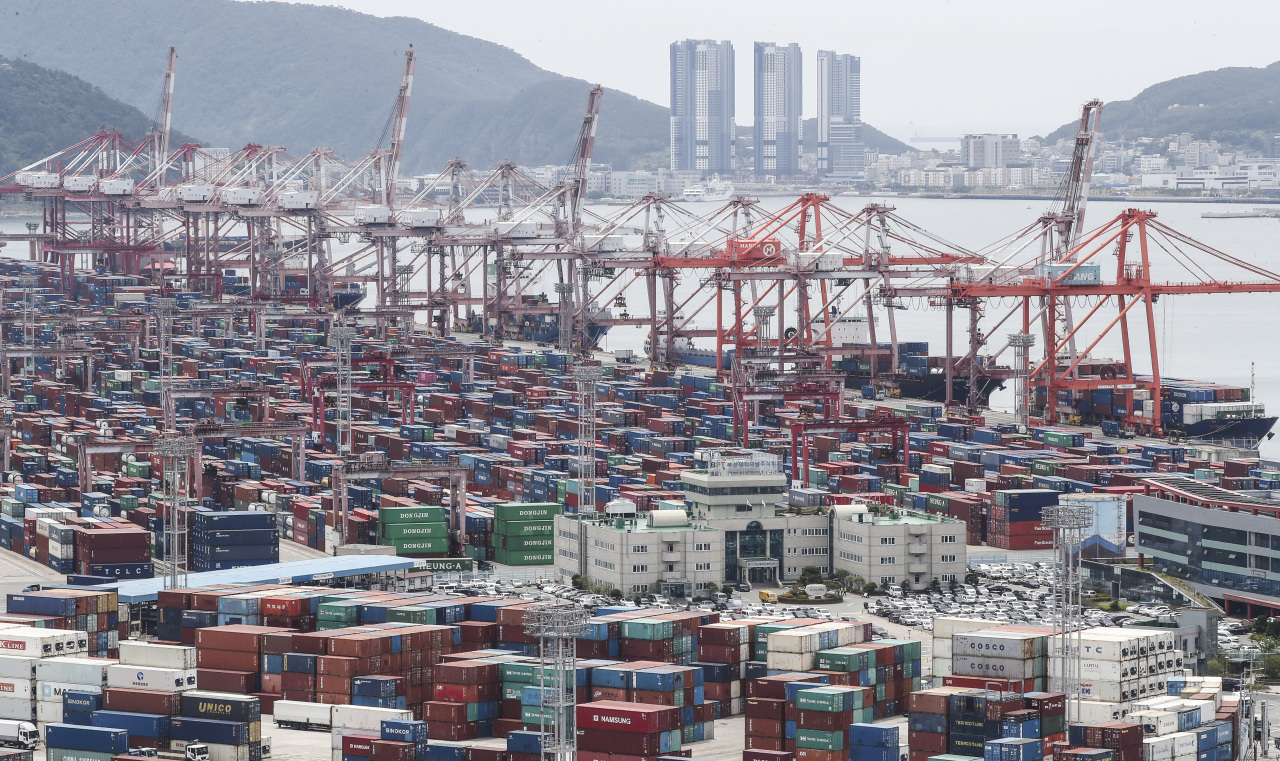 |
A view of container terminal at Busan Harbor last Friday (Yonhap) |
SEJONG -- South Korea’s trade deficit, posted over the past five months on a cumulative basis, expanded during the first 10 days of June due to a decline in exports as well as a spike in import prices of raw materials including crude.
The nation’s exports fell more than 12 percent during the June 1-10 period, compared to the same period of 2021, while imports increased by more than 17 percent, state data showed Monday.
Korea recorded a trade deficit of $5.59 billion for the first 10 days of the month. Collectively from Jan. 1 until June 10, the trade deficit reached $13.82 billion.
By month, Korea posted a deficit in January, April and May. If a deficit is reported once more in June, this would mark the first time the nation posts a trade deficit for three consecutive months in 14 years since 2008, when the nation was hit by the global financial crisis.
According to the Korea Customs Service, the nation’s exports posted $15.06 billion for the first 10 days of the month, down 12.7 percent compared to $17.26 billion posted over the corresponding period last year.
By item, outbound shipments of automobiles fell by 35.6 percent on-year, vessels by 29 percent, auto parts by 28.8 percent, mobile telecommunication gadgets by 27.5 percent, home appliances by 17.8 percent and steel products by 16.6 percent.
In contrast, exports of petroleum products and semiconductors increased by 94.5 percent and 0.8 percent, respectively.
By export destination, shipments to China decreased 16.2 percent, the US 9.7 percent, Vietnam 8.3 percent, the European Union 23.3 percent, Japan 17 percent and India 22.9 percent. But shipments to Taiwan and Singapore increased 11.2 percent and 73.7 percent.
The KCS said the on-year decline in exports was mainly attributed to a decrease in working days because of the June 1 local elections and June 6 Memorial Day. It claimed that the daily average exports increased 14.2 percent on-year.
Korea posted positive export growth over the past 19 consecutive months from November 2020 to May 2022. But some market insiders have warned that outbound shipments for the month of June could turn to be in the red.
A slowdown in exports would deal a severe blow to the gross domestic product of Korea, whose 2022 economic growth is projected to stay under 3 percent.
Despite the fewer working days, imports increased by 17.5 percent on-year to reach $21.06 billion during the June 1-10 period, KCS data showed.
Imports of coal surged 223.9 percent, crude 88.1 percent and petroleum products 86.2 percent. Inbound shipments of semiconductors and natural gas also increased 28.2 percent and 10.1 percent.
Shipments from Saudi Arabia shot up 119.4 percent, Australia 52.1 percent, Taiwan 31.8 percent and the US 21.3 percent.
By Kim Yon-se (
kys@heraldcorp.com)







![[Today’s K-pop] Blackpink’s Jennie, Lisa invited to Coachella as solo acts](http://res.heraldm.com/phpwas/restmb_idxmake.php?idx=644&simg=/content/image/2024/11/21/20241121050099_0.jpg)
